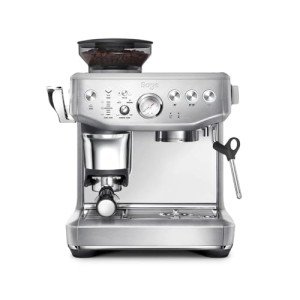Home Use Espresso Machines: A Comprehensive Guide
Espresso machines have actually become a staple in numerous homes as coffee lovers seek to replicate café-quality brews in the convenience of their kitchens. The increase in appeal has actually led to a diverse market filled with different designs, features, and prices. This article aims to provide a helpful overview of home use espresso machines, assisting readers browse their alternatives effectively.
Understanding Espresso Machines
Espresso machines work by forcing warm water through finely-ground coffee under high pressure, leading to a focused coffee drink referred to as espresso. There are numerous kinds of espresso machines classified based upon their brewing methods and level of automation. The most typical types consist of:
- Manual Espresso Machines: These require the user to control the pressure and water flow, enabling a more hands-on coffee-making experience.
- Semi-Automatic Espresso Machines: These use automatic control over water pressure, while the user manually grinds and tamps the coffee.
- Automatic Espresso Machines: With the push of a button, these machines automatically control the flow of water, making it simpler to brew espresso with constant outcomes.
- Super-Automatic Espresso Machines: These all-in-one machines deal with grinding, tampering, brewing, and even milk frothing, making them ideal for users trying to find benefit.
- Pill or Pod Machines: These use pre-packaged coffee pods to create espresso with minimal effort, but they restrict choice in developing methods and tastes.
Table: Comparison of Espresso Machine Types
| Type | Control Level | Reduce of Use | Cleaning up Level | Suitable For |
|---|---|---|---|---|
| Manual | User-controlled | Moderate | High | Coffee perfectionists |
| Semi-Automatic | Partial automation | Moderate | Moderate | Home baristas |
| Automatic | Completely automated | Easy | Low | Busy people |
| Super-Automatic | Fully automated | Really simple | Very low | Convenience seekers |
| Capsule/Pod | Completely automated | Very simple | Extremely low | Casual drinkers |
Key Features to Consider
When selecting a home use espresso machine, it's important to consider various functions that can significantly impact the quality of espresso and user experience.
- Pressure: Look for machines that provide a minimum of 9 bars of pressure, as this is thought about optimum for brewing espresso.
- Boiler Systems: Single vs. dual boiler systems figure out temperature level stability and the ability to brew espresso and steam milk all at once.
- Grinder: Integrated mills allow for newly ground coffee, which enhances flavor. Think about machines with adjustable grind settings.
- Milk Frother: For those who enjoy cappuccinos and lattes, a built-in steam wand or automatic frother is vital.
- Size and Design: Consider your cooking area space and aesthetic preferences. Machines are available in numerous sizes, from compact to big setups.
- Cost: Home espresso machines can vary from a few hundred to several thousand dollars, so it's vital to establish a budget before checking out alternatives.
Pros and Cons of Home Use Espresso Machines
| Pros | Cons |
|---|---|
| Benefit of developing coffee in your home | Preliminary investment can be high |
| Quality of espresso is typically remarkable | Requires some skill, especially with manual machines |
| Capability to explore flavors | Maintenance and cleaning can be labor-intensive |
| Can save cash in the long run | Not all machines will fit every coffee choice |
Upkeep and Cleaning Tips
Preserving an espresso machine is important for prolonging its life and guaranteeing consistent brew quality. Here are some helpful suggestions:
- Regular Descaling: Minerals from water can develop in the machine. Descale every 1-3 months, depending upon water firmness.
- Daily Cleaning: Rinse portafilters, baskets, and steam wands after each use to avoid coffee oils from developing residue.
- Use Filtered Water: This can help minimize mineral accumulation and enhance the taste of coffee.
- Replace Gaskets and Seals: These parts might wear in time and should be replaced to preserve pressure and performance.
- Read the Manual: Each machine has specific care instructions; following these will make sure durability.
FAQs About Home Use Espresso Machines
Q1: What is the best budget espresso machine?The best budget espresso machine frequently depends on individual needs, however models like the DeLonghi EC155 or the Breville Bambino are popular among users for supplying great worth. Q2: How long do home espresso machines typically last?With Buy Espresso Coffee Machines , home espresso machines can last anywhere from 5 to 15 years, depending on the quality of the machine and frequency of use. Q3: Can I make cappuccinos and lattes with any espresso machine?While most espresso machines can make coffees and lattes, having a reputable
steam wand or frother is vital for accomplishing the right milk texture.
Q4: Are super-automatic machines worth the investment?For those who focus on benefit and quick developing, super-automatic machines can be worth the financial investment, though they might lack some customizability in brew strength and flavor. Q5: What types of coffee beans are best for espresso?While individual preference contributes, beans identified as" espresso "blends are typically roasted darker, creating rich tastes and a creamy texture when brewed.
Purchasing a home espresso machine can change the day-to-day coffee routine into something unique, elevating home brews to café quality. By comprehending the different kinds of machines, key functions to consider, upkeep needs, and weighing the
pros and cons, consumers can make informed decisions that match their private preferences. As the espresso culture continues to grow, no matter the choice, every brew can be a delicious experience waiting to be enjoyed.

